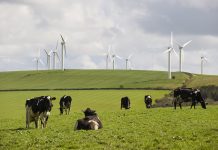Britain’s battered, burgeoning, resilient community energy sector today celebrates its Whitehall-neglected achievements, engaging the nation face-to-face in the realities of energy control and climate change.
Held down by Covid, by ministers’ ignorance and by Whitehall obstacles including a continuing ban on sale of their power to local consumers, the nation’s 424 crowd-funded green power ‘benefit societies’ and co-ops are fighting back after 2020, dubbed today in a new report their ‘worst year ever’.
In their first year essentially bereft of support from Johnson’s ‘build-back-greener’ government, fighting an unequal battle to sell small amounts of clean power to capricious giant wholesalers, the UK’s volunteer-led generators today provide stats proving the transformative – yet administratively patronised – power of their idea:
- Saving £2.9 million for fuel-poor householders, through energy efficiency advice
- Donating over £3 million to communities, including £200,000 on Covid-related support
- Reaching over 350,000 people on local generation
- Creating 82 new full-time equivalent jobs, aiding re-skilling for a green, fair recovery
- Raising £30 million for expansion from members, supporters and charities
The numbers come in the Community Energy State of the Sector 2021 report, released today by advocate bodies for Wales, Northern Ireland, Scotland and England. The report’s publication comes at the end of Community Energy Fortnight.
The sector controls 312MW of generation, including 8MW added last year. Continuing Government obstruction and withdrawals of support meant that 2020’s growth was only half that of 2019.
Adaptations now see 132 co-ops – around one third of Britain’s total – engaged in fighting fuel-poverty in their communities. Over 430 people have full-time jobs in community energy.
“Over the past year the sector has shown its resilience, perseverance, ingenuity and determination to tackle climate change, even in the face of reduced support, by diversifying and innovating in search of new business models”, says the report.
The four bodies’ work reinforces the recommendations of Parliament’s Environmental Audit Committee that Beis, Johnson and the Treasury must support community energy as essential to achieving net zero, as well as delivering huge social and community benefit.
Lessons have flowed freely for decades from Britain’s energy co-ops in achieving attitude change towards the climate and adjusting behaviour, not least since Westmill Solar in Oxfordshire won scooped the EU’s Schumacher prize in 2007. Among its 1,500 members, said farmer Adam Twine, were previous deniers of man-made climate change, now won over.
Beis secretary of state Kwarti Kwarteng this month ‘disappointed’ CE practitioners, telling a Conservative-led environmental committee he would take no steps to permit direct sale of their clean power, nor to extend a £10 million support scheme for rural energy co-ops.
The minister deferred to chancellor Sunak’s spending review next month, and to publication of Johnson’s delayed Net Zero Strategy.
Next Thursday afternoon, 1 July, over 40 MPs are committed to speak in a Commons debate, urging Johnson to take detailed steps to free up Britain’s citizens’ energy sector. Advocating a Local Electricity Act, bill sponsors from the Conservatives, LibDems and Plaid Cymru will argue co-operatives have untapped potential, overlooked by Whitehall and its instinctively pro-corporate perspective.
Steve Shaw, of Power for the People, urges direct approaches to MPs here. July’s 1 debate will repeat an LEB debate last October. Deputy Speaker Nigel Evans declared that debate had attracted potentially a record number of MPs willing to support a Local Electricity Bill.



